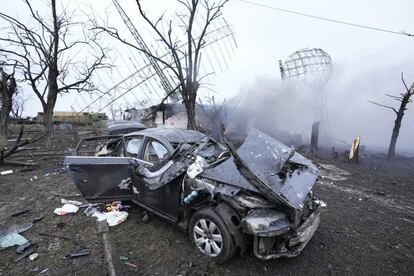Explainer: Why has Russia invaded Ukraine?
EL PAÍS answers the main questions surrounding the military action, including the causes, balance of firepower and what could happen next

Russia launched a full-scale invasion of Ukraine on Thursday. This explainer addresses the key questions and provides answers to what has happened so far in a conflict that has devastating potential for the Ukrainian population and Europe as a whole.
What does Vladimir Putin want?
The Kremlin has given several reasons as it attempts to justify its incursion into Ukrainian soil. Russia has long claimed that the Ukrainian government was planning to retake the separatist region of Donbas by force, and that the local population was threatened with “genocide.” There is no evidence to back this, and German Chancellor Olaf Scholz called the claim “ridiculous” at the recent Munich Security Conference. More broadly, Moscow argues that Ukraine is seeking to become a major military base for Western powers on its borders. Ukraine is not a NATO member and has received only small arms supplies as the Russian threat has intensified. To fully understand the Russian aggression, it is essential to look at other factors that Vladimir Putin does not mention: his desire to slow Ukraine’s integration into NATO and the European Union, and the full development of Ukrainian democracy. A fairly elected government with strong institutions would be a dangerous example for Russian citizens oppressed under his authoritarian regime to follow. Ukraine is also an essential part of the project of Russian imperial recovery that Putin is championing through the re-establishment of a zone of influence on the perimeter of the former USSR. His view is that the West should not interfere, which he made clear on Thursday in a speech by saying “anyone who tries to stand in our way” would suffer “consequences you have never encountered in your history” – believed to be a reference to the use of nuclear weapons.
How evenly matched are Russian and Ukrainian military forces?
There is a huge imbalance between the two sides. Russian armed forces suffered a prolonged period of deterioration after the collapse of the USSR, but Putin has made significant investments to modernize their capabilities. The Russians’ superiority is overwhelming in all domains: land, sea, air, cyber and space. Russia officially recorded $62 billion (€55.668 billion) of military spending in 2021, according to the Military Balance of the International Institute for Strategic Studies in London. Ukraine’s military spending was short of $5 billion.
Russia also has a nuclear arsenal comparable to that of the United States. Its troops have recent combat experience in Georgia (2008, when the Russian high command noted serious shortcomings in its forces), Ukraine (2014) and Syria (2015 onwards), leading to major advances in the development of its operational capabilities. Ukraine has been improving training and equipment for an army that, in 2014, was found in disarray. Western military instructors have helped, and the country has received certain weaponry that may be useful in self-defense, such as Turkish-made armed drones and Javelin anti-tank missiles. Ukraine is unlikely to be able to put up effective resistance, but a guerrilla war following the initial phase of invasion is another matter.
Is the attack a prelude to an occupation?
President Putin has said that he does not intend to occupy Ukraine, but rather to demilitarize it. This statement should be seen in the context of Russian leaders repeatedly claiming that the threat of invasion denounced by Western countries was pure paranoia. The Russians have entered Ukrainian territory from three sides, shelling multiple points and taking control of the Chernobyl nuclear power complex. An attempt to extend the territory of the Donbas separatists to carve up a new map of the region seems likely. There is also reason to believe that Russia may seek to establish a corridor between Donbas and Crimea, and even between Crimea and Odessa, a strategically important port city.
Will the West intervene militarily to support Ukraine?
In short, no. Ukraine is not a member of NATO and is therefore not covered by the alliance’s mutual defense clause. President Joe Biden has long made it clear that he would not send US forces to fight in Ukraine. Another aspect would be an increase in arms supplies to Ukraine, which the UK has already sent. The French government on Thursday issued statements that suggest it might be willing to follow suit, but the delivery of complex weapon systems is not a quick affair, and nor is training for their effective use. Meanwhile things could evolve very quickly on the ground.
What sanctions will the West impose?
Ukraine’s allies have made it clear that they will squeeze Russia with sanctions of sufficient intensity to damage its economy, but disagreement remains over some aspects. One set of sanctions is financial, with the aim of cutting off Russian banks’ access to capital markets, and another is commercial, blocking exports of cutting-edge technology. A third aspect on the table is personal sanctions against high-ranking members of the Russian regime, such as those already imposed after Moscow recognized the independence of the separatist territories of Donbas. Germany has announced the suspension of the authorization process for the implementation of the Nord Stream 2 gas pipeline, a project that has already been completed but not activated. A contentious issue is the SWIFT payment system, which is the main way companies send money to Russia from the West. The EU is not in favor of removing Russia from the system for now, unlike the US and UK.
How could Russia respond?
The most important weapon at the Kremlin’s disposal vis-à-vis the EU is the continent’s gas supply. As much as 90% of the EU’s gas is imported, and Russia supplies 40% of that, according to data provided by the president of the European Commission, Ursula von der Leyen, at the Munich Security Conference. Faced with a wave of Western sanctions, Moscow could enact supply disruptions or even cut Europe off. Von der Leyen announced that the EU is prepared for the latter scenario thanks to contingency plans made to increase imports of liquefied natural gas. Russia has other potential tools such as limiting exports of wheat – the price of which is already rising on the market – or titanium. Europe may suffer, but there is no doubt that Russia’s small and already fragile economy will suffer more in the medium and long term. In the short term, the Kremlin has substantial emergency funds at its disposal to cushion the blow.
What international support does Russia have?
The Russian invasion has provoked a broad wave of condemnation, and not just from Western countries. UN Secretary General António Guterres urged President Putin to withdraw his troops, though China and India have been conspicuous in their refusal to condemn the incursion so far. Russia is hoping that its increasingly close relationship with China, enshrined earlier this month in a major joint declaration outlining a common vision for a new world order, will give it some breathing space. It remains to be seen how far Beijing will be willing to go. Asian powers have maintained an ambiguous position on the invasion, and China has reiterated its support for the concept of territorial integrity, while also underlining the weight of Russia’s security concerns. It is likely that China could become an alternative market and technology provider for Russia in the face of the isolation it will suffer from the West.
What is at stake beyond Ukraine?
The priority is the lives of civilians facing the prospect of a terrible conflict. But beyond that, the shape of the world order in the 21st century is at stake, and Russia and China are seeking a readjustment. The EU’s foreign policy chief Josep Borrell has defined the struggle as between a multilateral order supported by organizations and international law, with the aspiration to protect human rights to the fullest extent, and a multipolar order with zones of influence, each with their own individual definitions of human rights. The Russian aggression against Ukraine is a central playing field in this geopolitical tug-of-war.
Tu suscripción se está usando en otro dispositivo
¿Quieres añadir otro usuario a tu suscripción?
Si continúas leyendo en este dispositivo, no se podrá leer en el otro.
FlechaTu suscripción se está usando en otro dispositivo y solo puedes acceder a EL PAÍS desde un dispositivo a la vez.
Si quieres compartir tu cuenta, cambia tu suscripción a la modalidad Premium, así podrás añadir otro usuario. Cada uno accederá con su propia cuenta de email, lo que os permitirá personalizar vuestra experiencia en EL PAÍS.
¿Tienes una suscripción de empresa? Accede aquí para contratar más cuentas.
En el caso de no saber quién está usando tu cuenta, te recomendamos cambiar tu contraseña aquí.
Si decides continuar compartiendo tu cuenta, este mensaje se mostrará en tu dispositivo y en el de la otra persona que está usando tu cuenta de forma indefinida, afectando a tu experiencia de lectura. Puedes consultar aquí los términos y condiciones de la suscripción digital.









































